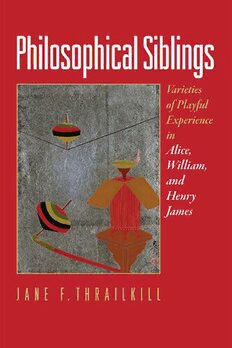
Philosophical Siblings: Varieties of Playful Experience in Alice, William, and Henry James PDF
Preview Philosophical Siblings: Varieties of Playful Experience in Alice, William, and Henry James
Philosophical Siblings Philosophical Siblings Varieties of Playful Experience in Alice, William, and Henry James Jane F. Thrailkill University of Pennsylvania Press Philadelphia Copyright © 2022 University of Pennsylvania Press All rights reserved. Except for brief quotations used for purposes of review or scholarly citation, none of this book may be reproduced in any form by any means without written permission from the publisher. Published by University of Pennsylvania Press Philadelphia, Pennsylvania 19104- 4112 www .upenn .edu /pennpress Printed in the United States of America on acid- free paper 10 9 8 7 6 5 4 3 2 1 Library of Congress Cataloging- in- Publication Data Names: Thrailkill, Jane F., author. Title: Philosophical siblings : varieties of playful experience in Alice, William, and Henry James / Jane F. Thrailkill. Description: Philadelphia : University of Pennsylvania Press, [2022] | Includes bibliographical references and index. Identifiers: LCCN 2021015361 | ISBN 978-0-8122-5332-0 (hardcover) Subjects: LCSH: James, Alice, 1848–1892. | James, William, 1842–1910. | James, Henry, 1843–1916. | Play (Philosophy) | Play in literature. | Consciousness in literature. Classification: LCC CT275.J278 T47 2022 | DDC 973.092—dc23 LC record available at https://lccn.loc.gov/2021015361 For Cathy Kerr, my brilliant friend (1964–2016) Contents Introduction. “Daring to Go Lightly amid the Solemnities” 1 1. Alice’s Bite: Body- Based Humor in The Diary of Alice James 22 Epistolary Affection and Bodily Travails 26 Humor and the Diary 39 Existential Bruises: Alice James’s Pain and Peirce’s Secondness 52 Laughter: Sounding the Note of the Minor 66 The Cosmic Joke: Consciousness and Dissolution 80 Coda: If You Tell a Joke in a Journal, Does Anybody Laugh? 90 2. “In the Same Game”: Consciousness and the Child in William James’s Lectures- Turned- Texts 96 Darwin’s Children: Experts in Adaptation, Plasticity, and Cognitive Extension 101 Learning to Doubt (One’s Elders): Louis Agassiz and Herbert Spencer 113 Sensory Psychology and Object- Oriented Pedagogy 126 Talking to Teachers and to Students 140 Philosophy as Play 157 Coda: “I Read Him for Work and for Play” 163 3. Play Is the Thing: Toying with Vision in Henry James’s Pedagogical Works 171 Playing with Reality: Inflexible Props and Transitional Objects 176 Maisie, Morgan, Miles, and Flora: Flipping the Educational Script 187 The Turn of the Screw and the Philosophical Toy 204 viii Contents Reading with the Thaumatrope in Mind 215 From Youth to Adulthood in “The Jolly Corner” 227 The Psychology of Cinema 241 Coda: Listening to Alice 248 Conclusion. “Pleasure Under Difficulties” 250 Notes 255 Index 287 Acknowledgments 299 Introduction “Daring to Go Lightly amid the Solemnities” And what are all men and women but children placed in a world of phenomena to learn, as in a vast kindergarten, in ways adapted to their sensuous and feeble apprehension? —Frank Sewall, The Angel of the State (1896) Alice James: an exemplary nineteenth- century neurasthenic. William James: a foundational figure for American psychology and philosophy. Henry James: a prominent author and literary critic. These iconic figures of nineteenth- century American culture and letters are close relations, children of the storied James family, but the three siblings’ writings have rarely been considered together, on an even playing field. The diarist, the psychologist, and the novelist have ap- peared to occupy distinct realms of cultural authority and to speak to different audiences (or, in the case of AJ’s Diary, to no audience at all).1 This book instead reads their writings collectively, as manifesting a shared project based in play. Their writings, I argue, constitute a long- term, slow- motion conversation, deploying the vocabulary of post- Darwinian science alongside the teasing, playful idiom they cultivated as members of an eccentric and close- knit family. What WJ (only half- jokingly) said of HJ, that “He’s really [. . .] a native of the James family, and knows no other country,” indicates the siblings’ sense of their own tight collectivism, accompanied by a sense of their quirky exceptional- ism.2 AJ, however, nuances her brother’s assertion of a particular “James- ness.” AJ sensuously described “the exquisite family perfume of the days gone by” as being “made up of the allusions, the memories and the point of view in common.”3 The
